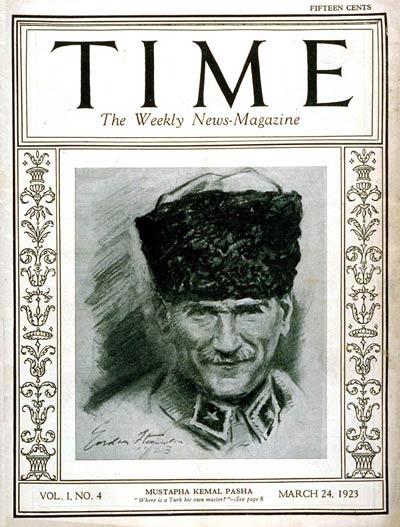The recent Flotilla Affair has sparked a round of reflection regarding Turkey’s role in the Middle East and the wider Muslim world. The questions being raised suggest that the U.S.-Turkey relationship is in a state of transition as the logic that cemented the alliance during the Cold War gives way to a variety of changing dynamics in the global political environment.
 Ataturk (Courtesy: Google Images, Time, UMass)
Ataturk (Courtesy: Google Images, Time, UMass)Turkey is a remarkably complicated country. It is a predominantly Muslim country with a democratic, (mostly) secular government. It is the frontier between Europe and Asia, straddling both geographically and politically, and it is also is home to a key energy corridor. It is a NATO member that has not been welcomed into the EU despite U.S. support for its candidacy (however little the endorsement of a non-member really matters), and it is also the successor state to the Ottoman Empire, which was a sprawling dynasty that ruled – often cruelly – a large section of the region, including much of the Arab World. Mustapha Kemal Ataturk, the father of modern Turkey, intended his Turkish project to be an enlightened break from that regime.
Some, like Stratfor’s George Friedman, think some form of Turkish domination will return to the region in this century. Josef Joffe wrote in the Financial Times yesterday that America should be wary of Turkey’s growing ambitions, and the Washington Post also noted the concerns among Western diplomats regarding a change in Turkey’s political demeanor. Turkey is changing both in its domestic politics and in its assertiveness abroad; however it is unclear at this point exactly what that change will mean for the U.S. or how far Turkey’s neighbors will welcome its rise. Moreover, warnings about growing Turkish ambition (like Joffe’s) tend to be colored with ominous tones, but it is also unclear that a stronger Turkey is necessarily a negative thing from a U.S. standpoint. As a NATO ally with many common interests, no one should confuse Turkey with Iran; rather, it is a special case all to its own.
Given all of this, it is important for the U.S. to think deeply about the future of the U.S.-Turkish relationship and take an approach to Turkey that is comprehensive and steady rather than rash and focused on short-term events. The U.S. actively engages with Turkey on a variety of issues, and, similar to its approach to China, the U.S. should continue to focus on the totality of the relationship in order to 1) develop a fuller understanding of Turkey’s changing place in the world and 2) maintain a healthy stability in the relationship to weather the occasional disagreement. A look at a map reveals how tied in Turkey is going to continue to be to America’s policies in Iraq, Russia, Europe, the Caucuses and elsewhere, and a smart Turkey policy will focus on durability in the relationship for the foreseeable future.